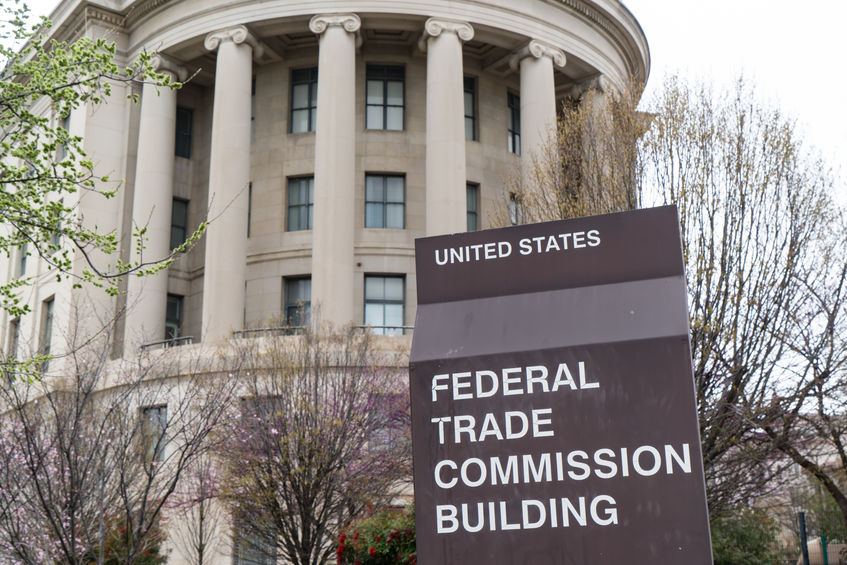Legal Briefs
Lender Ranking Website Accused By FTC Of Misleading Rankings
February 6, 2020 LendEDU, a Hoboken-based company that lists and ranks loan providers, came under fire this week after the FTC filed a complaint detailing how LendEDU charged businesses for higher positions in its rankings of lenders and promoted fake testimonials. Providing ratings for student loan refinancing, personal loans, and mortgage lenders, it is the first of these loan types that is in the spotlight.
LendEDU, a Hoboken-based company that lists and ranks loan providers, came under fire this week after the FTC filed a complaint detailing how LendEDU charged businesses for higher positions in its rankings of lenders and promoted fake testimonials. Providing ratings for student loan refinancing, personal loans, and mortgage lenders, it is the first of these loan types that is in the spotlight.
While LendEDU initially denied that it received any compensation for its lists, saying, “ratings are comparatively objective and not influenced by compensation in anyway” and that “research, news, ratings, and assessments are scrutinized using strict editorial integrity,” this assertion was disproved by the FTC’s investigation.
Emails were discovered which featured CEO Nathaniel Matherson and Vice President of Products Alexander Coleman discussing with a business the pricing per click to hold the #1 spot on the best student loan refinancing company list, as well as what sort of traffic could be expected at this ranking. Accompanying this was a contract between LendEDU and a student loan refinancing company, revealing that in return for compensation the company would drop “[n]o lower than position three” in the rankings. It was also found that if businesses who were already in the rankings refused to pay for the clicks they received, they would drop down in the list.
The testimonials that featured prominently on LendEDU’s homepage, which noted alleged consumers’ names, colleges, and years of graduation, were found to be wholly false, with the people portrayed in them being nonexistent.
And the reviews of LendEDU that were found on Trustpilot and subsequently posted to the company’s own website, were also shown to be fake. Of the 126 reviews, 123 were found to be 5-stars; and only 11 were proven to be from customers (this was confirmed as the emails matched those used by customers), the other 115 were deigned to be written by friends, family members, and associates of LendEDU members, as well as by LendEDU employee’s themselves under false names.
All this is coming after LendEDU landed in hot water following a controversy in 2018 that saw Matherson admit to working with others to create a fictitious expert on student loans, named Drew Cloud, who would give interviews and comments to publications, creating a pro-student loan refinancing discourse. According to Matherson, Cloud “was created as a way to connect with our readers (ex. people struggling to repay student debt) and give us the technical ability to post content to the WordPress website.” Cloud was even given a pixelated face and backstory that extended into high school, imbuing him with a passion for journalism even in his teenage years. Neither Matherson’s comments on Cloud nor his fictional biography do anything to explain how or why his creators decided to give him a name that is quite clearly fake.
LendEDU promptly agreed to settle the charges and pay $350,000 while not admitting or denying the allegations. The public has 30 days to comment on the settlement prior to it becoming final.
Appellate Court Affirms Decision in Merchant Funding Services, LLC v Micromanos Corporation etc.
February 1, 2020On January 29th, 2020 the Appellate Division, 2nd Department, of the Supreme Court of New York, upheld the original decision issued in Merchant Funding Services, LLC v Micromanos, etc. et al.. The case concerns a Confession of Judgment (COJ) filed following Micromanos’ default on a merchant cash advance contract. The defendants sought to vacate the COJ on the basis that the underlying agreement was allegedly a criminally usurious loan but the original judge ruled in favor of the plaintiffs.
The case was so notable that deBanked published a summary of the decision three years ago. Of particular interest is that the defendants not only lost but were accused by the judge of attempting to mislead the Court. Despite that, the defendants appealed.
The defendants have now lost again. The underlying case law they had relied on to support their arguments, Volunteer Pharmacy, was overturned the same day this decision was issued, leaving little room to wonder why the Appellate Division ruled accordingly.
One Of The Most Devastating Court Decisions Against Merchant Cash Advances Has Been Overturned
January 29, 2020 Merchant Cash Advances have sat on comfortable legal footing in New York ever since an appellate court ruled in favor of Pearl Beta Funding, LLC against Champion Auto Sales, LLC in 2018, but even so, it hasn’t stopped lawyers from trying to invalidate merchant cash advance (MCA) contracts on behalf of aggrieved customers.
Merchant Cash Advances have sat on comfortable legal footing in New York ever since an appellate court ruled in favor of Pearl Beta Funding, LLC against Champion Auto Sales, LLC in 2018, but even so, it hasn’t stopped lawyers from trying to invalidate merchant cash advance (MCA) contracts on behalf of aggrieved customers.
That’s because an MCA provided by New York-based Merchant Funding Services LLC to a business known as Volunteer Pharmacy in 2016 was ruled by New York Supreme Court Judge David F Everett to be so “criminally usurious on its face” that the normal process required to vacate a Confession of Judgment could simply be bypassed without even having to evaluate the merits of each side’s arguments and the matter automatically won in favor of Volunteer Pharmacy. The judge’s written decision, which voided the MCA contract ab initio, was replete with a scathing opinion of MFS’s business model.
The decision quietly stunned the merchant cash advance industry. MFS understandably appealed.
Dozens of lawsuits against MCA companies in the ensuing years went on to cite Judge Everett’s decision in Volunteer Pharmacy with limited success. And while the industry sat around to find out what would happen in that case, Pearl Beta Funding, a rival to Merchant Funding Services, won an appeal of its own, the landmark usury case in March 2018 that seemingly solidified once and for all the commonly held understanding that such MCA agreements were not usurious.
Despite this, the uncertainty of Volunteer Pharmacy still lingered in the background, that is until now.
On January 29th, 2020 the Appellate Division, 2nd Department, of the Supreme Court of New York, overturned Judge Everett’s decision and ruled in favor of Merchant Funding Services. The panel of judges said they need not even weigh a lot of Everett’s contentions because he was wrong on the underlying procedural issue, that a judgment by confession could be vacated in such an instance without having to go through the normal legal process.
The ruling ultimately provides clarity on the process that determines how a judgment by confession can be vacated. One major impact is that lawyers seeking to invalidate merchant cash advance agreements will no longer have Volunteer Pharmacy as a crutch to rely on.
Former 1 Global Capital CFO Alan Heide Sentenced to 5 Years in Prison
January 17, 2020Alan Heide, the former CFO of defunct Hallandale Beach-based 1 Global Capital, was sentenced to 5 years in prison earlier this week for his role in the company’s securities fraud. He is one of three individuals that have pled guilty so far and the first to be sentenced.
The other individuals, attorney Jan Douglas Atlas and former 1 Global COO Steven Allen Schwartz are awaiting their sentencing.
Additional individuals are still expected to be charged.
SEC, US Attorney Charge Steven A. Schwartz in 1 Global Capital Case
January 6, 2020 New criminal and civil charges have been filed against an individual in the 1 Global Capital case. This time it’s Steven A. Schwartz, who served as 1 Global’s Director and Chief Operating Officer.
New criminal and civil charges have been filed against an individual in the 1 Global Capital case. This time it’s Steven A. Schwartz, who served as 1 Global’s Director and Chief Operating Officer.
The SEC alleges that Schwartz aided and abetted former CEO Carl Ruderman in carrying out a securities fraud.
The US Attorney for the Southern District of Florida separately alleged that Schwartz engaged in a conspiracy to commit wire fraud and securities fraud.
Schwartz is the third person to be charged criminally in connection with 1 Global Capital’s scheme. Alan Heide and Jan Atlas already pled guilty to their roles in the fraud.
The SEC said of its case against Schwartz:
The complaint further alleges that Schwartz became trustee of a Ruderman family trust in June 2014, and that shortly afterwards, Ruderman had Schwartz execute an agreement conveying ownership of 1 Global to the trust. As alleged, until 1 Global declared bankruptcy in July 2018, Schwartz allowed Ruderman to use the trust to misappropriate several million dollars in investor funds to pay for Ruderman’s luxury lifestyle.
Jonathan Braun Has Checked In To Prison
January 2, 2020 Jon Braun, who Bloomberg Businessweek profiled in a 2018 story series, checked into FCI Otisville on Thursday. He was sentenced to 10 years in prison on May 28th for drug related offenses he committed a decade ago. He was originally scheduled to surrender on August 25th but he successfully delayed the date until today, January 2nd.
Jon Braun, who Bloomberg Businessweek profiled in a 2018 story series, checked into FCI Otisville on Thursday. He was sentenced to 10 years in prison on May 28th for drug related offenses he committed a decade ago. He was originally scheduled to surrender on August 25th but he successfully delayed the date until today, January 2nd.
I have not attempted to contact Mr. Braun since the day of his sentencing. But purely by chance I shared an elevator with him in the Brooklyn Federal Courthouse on May 28th just mere minutes after he had been handed ten years. Given the opportunity, I asked him how he felt about what just happened.
“I hope it goes by quick,” he replied stoically.
Sentencings in 1 Global Capital Criminal Cases Delayed
December 18, 2019The sentencing dates for the two individuals that pled guilty for their part in the the 1 Global Capital mess, have been delayed. Jan Douglas Atlas’s sentencing has been pushed back until March 2020 with a date to be determined, while Alan Heide’s has been rescheduled to Jan 14, 2020.
More Individuals Expected to Be Criminally Charged in 1 Global Capital Case
November 30, 2019 Federal prosecutors have asked a Court to consolidate criminal cases against 1 Global Capital defendants Alan Heide and Jan D. Atlas on the basis that there is substantial overlap between them and that additional individuals are expected to be charged. “Considerable judicial resources may be conserved if, going forward, a single judge is chosen to preside over all 1 Global-related cases,” prosecutors argue. The number of forthcoming defendants was not revealed but has been described as “multiple additional co-conspirators.”
Federal prosecutors have asked a Court to consolidate criminal cases against 1 Global Capital defendants Alan Heide and Jan D. Atlas on the basis that there is substantial overlap between them and that additional individuals are expected to be charged. “Considerable judicial resources may be conserved if, going forward, a single judge is chosen to preside over all 1 Global-related cases,” prosecutors argue. The number of forthcoming defendants was not revealed but has been described as “multiple additional co-conspirators.”
The case, far from over, is being characterized as an active investigation.
Heide, 1 Global’s former CFO, pled guilty on August 23, 2019. He is scheduled to be sentenced on December 18th. Atlas, an attorney who provided fraudulent legal cover for 1 Global via knowingly false opinion letters, pled guilty to 1 count of securities fraud in October. He is scheduled to be sentenced on January 10th.
Hallandale Beach-based 1 Global Capital was once ranked among the largest alternative small business funders by deBanked. That all changed in July 2018 with a sudden bankruptcy filing that revealed concurrent investigations being carried out by the SEC and a US Attorney’s Office.
Prosecutors are calling the company a multi-faceted securities fraud and Ponzi scheme that victimized at least 3,600 investors across the country. While the company took in more than $330 million, $100 million of it is expected to be returned to investors through a bankruptcy court liquidation.
The company’s former chairman and CEO has already consented to judgment with the SEC and agreed to be liable for disgorgement of $32,587,166 + $1,517,273 in interest and a civil penalty of $15,000,000. Shortly thereafter, the SEC reported that he had satisfied the judgment in full with the exception of the stipulation that he sell his condo. Although he has not been criminally charged, prosecutors say that Heide and Atlas both ultimately took direction from, and reported to the company’s former chairman and CEO.
Individuals familiar with the firm may recall that 1 Global Capital was previously reported as being named 1st Global Capital. However, another company bearing the same name sued them for trademark infringment. Since then, news related to the South Florida ponzi scheme have referred to the company by its legal name, 1 Global Capital, LLC.





























